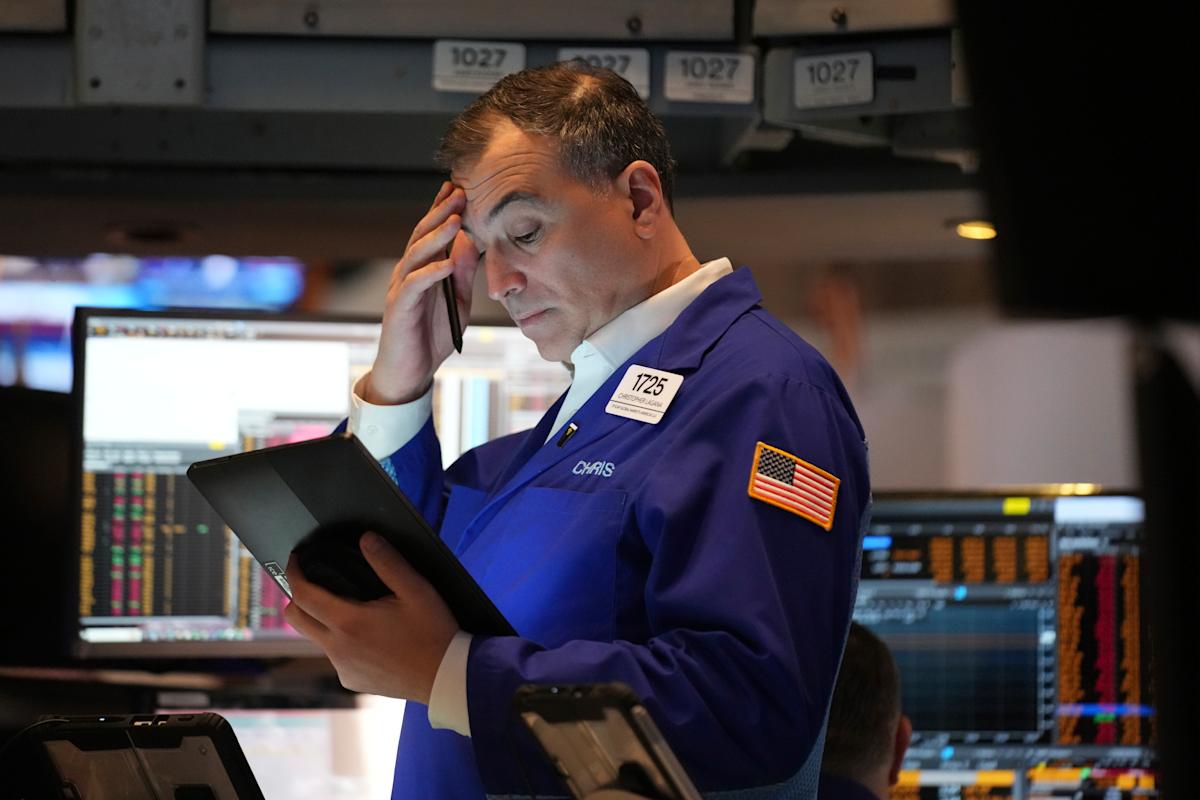Stocks were sharply lower in midday trading Friday, putting major indexes on track for their third straight day of declines, as investors digested closely watched reports on inflation and consumer sentiment that heightened concerns about the health of the U.S. economy.
The S&P 500 and tech-heavy Nasdaq Composite were down 1.5% and 2%, respectively, in recent trading, while the Dow Jones Industrial Average fell 1.3%. Stocks have retreated in recent days on fresh concerns about tariffs as President Trump announced levies on all imports of cars and auto parts. Nonetheless, the major indexes came into Friday’s session in positive territory for the week, putting them in position to post gains for the second straight week, as the market slowly rebounds from a month-long selloff.
The Personal Consumption Expenditures report released this morning showed that core inflation, which excludes volatile food and energy prices, rose more than expected last month. The higher-than-expected reading—annual core PCE came in at 2.8% in February, versus the 2.7% economists had estimated—heightens concerns that the U.S. economy could be headed toward a high-inflation, low-growth period, especially once the impact of tariffs is felt in the coming months.
Consumer sentiment data from the University of Michigan was also worse than expected, with the main index falling to its lowest level since late 2022. Inflation expectations also surged to their highest level since 2022. The report is the latest indication that consumer confidence is waning, which threatens to cause spending to slow and economic growth to stall.
The yield on the 10-year Treasury note, which tends to fall when concerns about the economy rise, was at 4.28% recently, down from 4.37% at yesterday’s close. The yield, which affects borrowing costs on all sorts of loans, notably mortgages, hit its highest level in a month on Thursday.
Mega-cap technology stocks were lower across the board, led by 4% declines for Amazon (AMZN) and Alphabet (GOOG). Tesla (TSLA) and Meta Platforms (META) were down about 3%, while Apple (AAPL), Nvidia (NVDA), Microsoft (MSFT) and Broadcom (AVGO) also lost ground.
Among other noteworthy tech sector movers, data analytics software provider Palantir (PLTR), an AI investor favorite that was hit particularly hard during the recent stock market rout, was down 6%. Chipmakers Intel (INTC) and Marvell Technology (MRVL) slid 3.5% and 4.5%, respectively.
Shares of AppLovin (APP) rose nearly 7% after losing one-fifth of their value yesterday when Muddy Waters became the latest short-seller to issue a report alleging inappropriate business practices by the advertising technology company.
Lululemon Athletica (LULU) shares tumbled 14% after the apparel retailer issued disappointing guidance citing a slowdown in consumer spending owing to concerns about inflation and the economy. Ralph Lauren (RL) shares were down more than 4%.
Shares of Strategy (MSTR), formerly known as MicroStrategy and one of the world’s largest holders of bitcoin, were down nearly 7% as the digital currency lost ground. Bitcoin was at $84,000, down from an overnight high of $87,700.
Gold futures were up 0.9% at $3,120 an ounce, trading near record-high levels, while West Texas Intermediate futures, the U.S. crude oil benchmark, slipped 1% to $69.20 per barrel.
WR Berkley Jumps to Record as Japan’s MSI to Take Stake
16 minutes ago
Shares of W.R. Berkley Corporation (WRB) surged Friday to lead gainers on the S&P 500 after the line insurance firm said Japan’s Mitsui Sumitomo Insurance will take a 15% stake in the company.
MSI will buy shares from the open market or other third parties with the goal of building a 15% stake by the end of March 2026, the companies said in a statement.
Once MSI reaches a 4.9% stake, the Japanese firm has committed to vote the shares in favor of what the Berkley family recommends. The Berkley family, with its 16% stake, will remain a larger shareholder than MSI.
After MSI surpasses a 12.5% stake, the Berkley family has said it will support the nomination and election of an MSI-backed board member. The family itself intends to continue having two board seats, according to a news release.
The agreement “will not have any effect on the day-to-day operations of the Company, nor will these arrangements reduce the Berkley Family’s commitment to the Company,” the news release said Friday.
W.R. Berkley shares were recently up just under 8% and set an intraday record of $76.38 earlier in the session
AppLovin Rebounds as Company to Investigate Short Reports
58 minutes ago
AppLovin (APP) shares rebounded Friday morning after losing one-fifth of their value yesterday, as the company said it has hired an attorney to investigate recent short seller reports.
The online ad seller said on Friday that it has hired Alex Spiro to “conduct an independent review and investigation” into the recent short seller reports. Spiro has represented a number of high-profile clients in a variety of cases, including Tesla (TSLA) CEO Elon Musk, New York City Mayor Eric Adams, and Jay-Z.
“We are fully committed to defending the Company, its operations, and its reputation from those seeking to manipulate the market through false narratives,” AppLovin CEO Adam Foroughi said in a statement.
AppLovin shares were up about 5% in recent trading. They have gained about 275% over the last 12 months, but are down 45% from their record closing high in mid-February.
TradingView
AppLovin has been the target of three reports from short sellers over the last month, with the latest published by Muddy Waters on Thursday. The latest report called AppLovin’s business practices “scammy,” and said the company could face repercussions from its business partners.
In a pair of reports released last month, short sellers from Culper Research and Fuzzy Panda Research alleged that AppLovin engaged in a range of fraudulent or deceitful practices.
Investopedia has not independently verified the allegations in any of the short reports.
Nvidia-Backed CoreWeave Set to Start Trading Today
1 hr 29 min ago
CoreWeave, a cloud computing company backed by Nvidia (NVDA), priced its initial public offering at $40 per share Thursday, raising $1.5 billion.
That is below its expected range of $47 to $55 per share, and CoreWeave offered 37.5 million shares, fewer than the 49 million shares previously anticipated. That would leave the company’s valuation at about $23 billion on a fully diluted basis. The stock is set to begin trading Friday on the Nasdaq under the ticker “CRWV.”
CoreWeave makes money by providing its clients with access to data centers, which are used to develop artificial intelligence models. It was founded in 2017 as a crypto miner, before pivoting to selling cloud infrastructure.
Among the issues raised as risk factors for investors in CoreWeave’s IPO, beyond its short history, is its high levels of debt. According to its prospectus, the company owed $8 billion in debt as of the end of last year. Last year, around 32% of its net cash went to servicing that debt.
CoreWeave is also dependent on Nvidia’s chips for its business and Microsoft (MSFT) for a large portion of its sales. Microsoft represents CoreWeave’s biggest client, accounting for 62% of its $1.9 billion in revenue last year, according to its prospectus.
The company said it faces stiff competition as well. “The market for AI cloud infrastructure and software is intensely competitive and is rapidly evolving, characterized by changes in technology, customer requirements, industry standards, regulatory developments, and frequent introductions of new or improved solutions and services,” it said.
Among its key competitors are big firms like Amazon’s (AMZN) cloud computing platform AWS, Alphabet’s Google (GOOGL) cloud platform, International Business Machines (IBM), Microsoft’s Azure, and Oracle (ORCL), some of which are customers. It said it also competes with smaller cloud service providers such as Crusoe and Lambda.
Lululemon Slides on Weak Outlook as Consumer Spending Slows
2 hr 21 min ago
Shares of apparel retailer Lululemon Athletica (LULU) sank early Friday as a soft outlook outweighed better-than-expected quarterly results.
For the fiscal fourth quarter that ended Feb. 2, Lululemon reported earnings of $6.14 per share on revenue of $3.61 billion. Analysts had forecast EPS of $5.88 on $3.58 billion in sales, according to estimates compiled by Visible Alpha. The results managed to top estimates despite comparable store sales falling short of estimates at 3%.
Lululemon said it expects first-quarter EPS of $2.53 to $2.58 on revenue of $2.34 billion to $2.36 billion, and full-year EPS between $14.95 and $15.15 on revenue of $11.15 billion to $11.3 billion. All four metrics were below consensus forecasts.
“Consumers are spending less due to increased concerns about inflation and the economy,” Lululemon CEO Calvin McDonald said in Thursday’s earnings call, according to an AlphaSense transcript. “This is manifesting itself into slower traffic across the industry in the US in quarter one, which we are experiencing in our business as well.”
Lululemon shares were down 13% in early trading Friday and are now down 22% since the start of the year.
Major Indexes on Pace for 2nd Straight Week of Gains
2 hr 53 min ago
Major stock indexes enter Friday in positive territory for the week, putting them on track for their second consecutive week of gains after a month-long slide.
The Dow Jones Industrial Average has gained 0.8% so far this week, while the S&P 500 and Nasdaq Composite were up 0.5% and 0.1%, respectively, through Thursday’s close.
TradingView
Still, the major indexes are poised to record big losses for the month. The Dow has lost 3.5% so far this month, while the S&P 500 is down 4.4% and the Nasdaq has fallen 5.5%.
GM Levels to Watch After Stock Plunges on Tariff News
3 hr 8 min ago
General Motors (GM) shares were losing ground in premarket trading after tumbling Thursday amid concerns about the potential impact of the Trump administration’s newly announced tariffs on auto imports.
GM shares have remained under pressure since breaking down below the neckline of a head and shoulders formation in late January.
More recently, a bearish engulfing pattern emerged on the chart following a short-lived upswing that preceded today’s drop on above-average volume. It’s also worth pointing out that the 50-day moving average (MA) recently crossed below the 200-day MA to form a death cross, a chart indicator warning of lower prices.
Investors should monitor important support levels on GM’s chart around $45 and $40, while also watching key overhead areas near $50 and $55.
GM shares were down 0.5% at around $47 in recent premarket trading, after falling more than 7% yesterday to lead S&P 500 decliners. The stock is down more than 20% from its 52-week high set in late November.
Read the full technical analysis piece here.
Major Index Futures Slightly Lower
4 hours ago
Futures tied to the Dow Jones Industrial Average were down 0.1%.
TradingView
S&P 500 futures were also off 0.1%.
TradingView
Nasdaq 100 futures slipped 0.2%.
TradingView


















